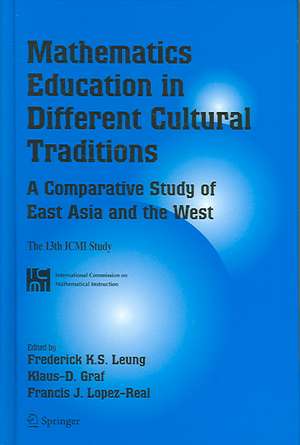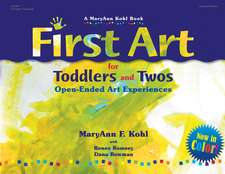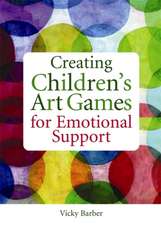Mathematics Education in Different Cultural Traditions- A Comparative Study of East Asia and the West: The 13th ICMI Study: New ICMI Study Series, cartea 9
Editat de Frederick Koon-Shing Leung, Klaus-D. Graf, Francis J. Lopez-Realen Limba Engleză Hardback – 13 mar 2006
| Toate formatele și edițiile | Preț | Express |
|---|---|---|
| Paperback (1) | 1395.00 lei 6-8 săpt. | |
| Springer Us – 23 noi 2010 | 1395.00 lei 6-8 săpt. | |
| Hardback (1) | 1238.23 lei 6-8 săpt. | |
| Springer Us – 13 mar 2006 | 1238.23 lei 6-8 săpt. |
Din seria New ICMI Study Series
-
 Preț: 443.10 lei
Preț: 443.10 lei -
 Preț: 399.29 lei
Preț: 399.29 lei -
 Preț: 398.15 lei
Preț: 398.15 lei -
 Preț: 411.64 lei
Preț: 411.64 lei - 15%
 Preț: 644.63 lei
Preț: 644.63 lei - 19%
 Preț: 574.39 lei
Preț: 574.39 lei - 15%
 Preț: 646.43 lei
Preț: 646.43 lei - 18%
 Preț: 951.47 lei
Preț: 951.47 lei - 18%
 Preț: 1226.73 lei
Preț: 1226.73 lei - 18%
 Preț: 951.47 lei
Preț: 951.47 lei -
 Preț: 332.70 lei
Preț: 332.70 lei - 15%
 Preț: 653.98 lei
Preț: 653.98 lei - 15%
 Preț: 646.43 lei
Preț: 646.43 lei - 18%
 Preț: 951.91 lei
Preț: 951.91 lei - 18%
 Preț: 1244.59 lei
Preț: 1244.59 lei -
 Preț: 405.06 lei
Preț: 405.06 lei - 18%
 Preț: 947.85 lei
Preț: 947.85 lei - 18%
 Preț: 955.40 lei
Preț: 955.40 lei - 18%
 Preț: 1396.74 lei
Preț: 1396.74 lei - 18%
 Preț: 955.08 lei
Preț: 955.08 lei
Preț: 1238.23 lei
Preț vechi: 1510.05 lei
-18% Nou
Puncte Express: 1857
Preț estimativ în valută:
236.92€ • 247.40$ • 195.65£
236.92€ • 247.40$ • 195.65£
Carte tipărită la comandă
Livrare economică 16-30 aprilie
Preluare comenzi: 021 569.72.76
Specificații
ISBN-13: 9780387297224
ISBN-10: 0387297227
Pagini: 598
Ilustrații: XIV, 598 p.
Dimensiuni: 156 x 234 x 33 mm
Greutate: 1.03 kg
Ediția:2006
Editura: Springer Us
Colecția Springer
Seria New ICMI Study Series
Locul publicării:New York, NY, United States
ISBN-10: 0387297227
Pagini: 598
Ilustrații: XIV, 598 p.
Dimensiuni: 156 x 234 x 33 mm
Greutate: 1.03 kg
Ediția:2006
Editura: Springer Us
Colecția Springer
Seria New ICMI Study Series
Locul publicării:New York, NY, United States
Public țintă
ResearchCuprins
Mathematics Education in Different Cultural Traditions: A Comparative Study of East Asia and the West.- Mathematics Education in Different Cultural Traditions: A Comparative Study of East Asia and the West.- Research on Affect in Mathematics Education: A Reconceptualisation.- Mathematics Education in East Asia and the West: Does Culture Matter?.- Context of Mathematical Education.- A Traditional Aspect of Mathematics Education in Japan.- From Wasan to Yozan.- Perceptions of Mathematics and Mathematics Education in the Course of History - A Review of Western Perspectives.- Historical Topics as Indicators for the Existence of Fundamentals in Educational Mathematics.- From “Entering the Way” to “Exiting the Way”: In Search of a Bridge to Span “Basic Skills” and “Process Abilities”.- Practice Makes Perfect: A Key Belief in China.- The Origins of Pupils’ Awareness of Teachers’ Mathematics Pedagogical Values: Confucianism and Buddhism - Driven.- Curriculum.- Some Comparative Studies between French and Vietnamese Curricula.- An Overview of the Mathematics Curricula in the West and East.- Classification and Framing of Mathematical Knowledge in Hong Kong, Mainland China, Singapore, and the United States.- Comparative Study of Arithmetic Problems in Singaporean and American Mathematics Textbooks.- A Comparative Study of the Mathematics Textbooks of China, England, Japan, Korea, and the United States.- A Comparison of Mathematics Performance Between East and West: What PISA and TIMSS Can Tell Us.- Case Studies on Mathematics Assessment Practices in Australian and Chinese Primary Schools.- Philippine Perspective on the ICMI Comparative Study.- Teaching and Learning.- The TIMSS 1995 and 1999 Video Studies.- Proposal for a Framework to Analyse MathematicsEducation in Eastern and Western Traditions.- Cultural Diversity and the Learner’s Perspective: Attending to Voice and Context.- Mathematics Education in China: From a Cultural Perspective.- Mathematics Education and Information and Communication Technologies.- Cultural Awareness Arising from Internet Communication between Japanese and Australian Classrooms.- The International Distance Learning Activities of HSARUC.- Distance Learning between Japanese and German Classrooms.- Values and Beliefs.- Comparing Primary and Secondary Mathematics Teachers’ Beliefs about Mathematics, Mathematics Learning and Mathematics Teaching in Hong Kong and Australia.- The Impact of Cultural Differences on Middle School Mathematics Teachers’ Beliefs in the U.S. and China.- U.S. and Chinese Teachers’ Cultural Values of Representations in Mathematics Education.- A Comparison of Mathematical Values Conveyed in Mathematics Textbooks in China and Australia.- Values and Classroom Interaction: Students’ Struggle for Sense Making.- Trip for the Body, Expedition for the Soul: An Exploratory Survey of Two East Asian Teachers of Mathematics in Australia.- Conceptualising Pedagogical Values and Identities in Teacher Development.- Outlook and Conclusions.- Elements of a Semiotic Analysis of the Secondary Level Classroom in Japan.- Other Conventions in Mathematics and Mathematics Education.- What Comes After This Comparative Study — More Competitions or More Collaborations?.
Notă biografică
Frederick Leung is a professor of mathematics education at The University of Hong Kong, specializing in international comparison of curriculum, and the relationship between culture and mathematics teaching and learning
Klaus-D. Graf is a professor of computer science at Freie Universitaet Berlin, Germany, specializing in applications in education and society
Francis Lopez-Real is a professor of mathematics education at The University of Hong Kong, specializing in problem-solving and dynamic geometry
Klaus-D. Graf is a professor of computer science at Freie Universitaet Berlin, Germany, specializing in applications in education and society
Francis Lopez-Real is a professor of mathematics education at The University of Hong Kong, specializing in problem-solving and dynamic geometry
Textul de pe ultima copertă
In recent years there has been an upsurge of interest concerning international comparisons of mathematics education, stimulated in part by large-scale studies such as TIMSS and PISA. However, many educators have felt that the analysis of such comparisons requires a deep understanding of the underlying cultural and social factors involved, and this perspective led to the 13th ICMI Study Conference being convened to consider the issues. Because of the impossible complexity of trying to cover all different cultural traditions worldwide it was decided to focus on two significant traditions, broadly speaking East Asia and the West. This important volume is the outcome of the ICMI Study.
The volume covers a very wide field including the contexts of mathematics education, the curriculum, teaching and learning, and teachers’ values and beliefs. Within these broad parameters some of the particular cross-cultural issues that are discussed include intuition and logical reasoning, influences of Confucianism and Ancient Greek traditions, basic skills and process abilities, learners’ perspectives, assessment practices, text books and ICT multimedia.
Throughout the book emphasis is placed on uncovering and understanding differences and similarities, not just between these two major traditions but within the cultures themselves. Simplistic analyses or solutions are avoided and the authors demonstrate a cultural sensitivity that results in a collaborative, rather than competitive, spirit evident in the comparisons that are made. Much of the focus is on learning together, as much from our failures as our successes. The contributing authors are highly experienced and eminent members of the mathematics education community and together they have provided us with a book that is an invaluable source of information, discussion, reflection and insight. Mathematics Education in Different Cultural Traditions will be of special interest tomathematics teachers, teacher educators, researchers, education administrators, curriculum developers, and student teachers.
The volume covers a very wide field including the contexts of mathematics education, the curriculum, teaching and learning, and teachers’ values and beliefs. Within these broad parameters some of the particular cross-cultural issues that are discussed include intuition and logical reasoning, influences of Confucianism and Ancient Greek traditions, basic skills and process abilities, learners’ perspectives, assessment practices, text books and ICT multimedia.
Throughout the book emphasis is placed on uncovering and understanding differences and similarities, not just between these two major traditions but within the cultures themselves. Simplistic analyses or solutions are avoided and the authors demonstrate a cultural sensitivity that results in a collaborative, rather than competitive, spirit evident in the comparisons that are made. Much of the focus is on learning together, as much from our failures as our successes. The contributing authors are highly experienced and eminent members of the mathematics education community and together they have provided us with a book that is an invaluable source of information, discussion, reflection and insight. Mathematics Education in Different Cultural Traditions will be of special interest tomathematics teachers, teacher educators, researchers, education administrators, curriculum developers, and student teachers.
Caracteristici
Under the auspices of the International Commission for Mathematical Instruction, Springer is the publisher of all Study Reports. ICMI Study 13 brings together leading experts from around the world to research and report on mathematics education in a global context Includes supplementary material: sn.pub/extras







